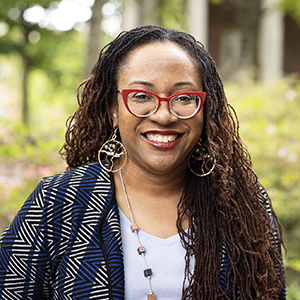Panthea Lee
Reboot
Exiting the Road to Hell: How We Reclaim Agency & Responsibility in Our Fights for Justice
Ebony Elizabeth Thomas
University of Michigan
We Have Always Dreamed of (Afro)futures: Notes beyond the Dark Fantastic
Sarah Ellis
The Future of Audiences and Mixed Reality Performances
Tuesday, Oct 19, 9:00 am London, 7:00 pm Sydney (video available to attendees in Urras-Anarres; find your region)
Sarah Ellis is an award-winning producer currently working as Director of Digital Development for the Royal Shakespeare Company. The latest partnership for the RSC is the Audience of the Future Live Performance Demonstrator ‘Dream’ funded by UKRI.
Sarah is a fellow of the University of Worcester for her work in arts and technology, and has been awarded The Hospital Club & Creatives Industries award for cross industry collaboration for her work on the RSC’s The Tempest (with Intel and The Imaginarium Studios.) In 2013 she was listed in the 100 most influential people working in Gaming and Technology by The Hospital Club and Guardian Culture. She is an Industry Champion for the Creative Industries Policy and Evidence Centre, which helps inform academic research on the creative industries. She has been appointed Chair of digital agency, The Space, established by Arts Council England and the BBC.
Panthea Lee
 Exiting the Road to Hell: How We Reclaim Agency & Responsibility in Our Fights for Justice
Exiting the Road to Hell: How We Reclaim Agency & Responsibility in Our Fights for Justice
Tuesday, Oct 19, 8:00 am San Francisco, 4:00 pm London (video available to attendees in Kaze no Tani; find your region)
Panthea Lee is a strategist, organizer, designer, and facilitator, and the Executive Director of Reboot. She is passionate about building transformative coalitions between communities, activists, movements, and institutions to tackle structural inequity—and working with artists to realize courageous social change.
Panthea is a pioneer in designing and guiding multi-stakeholder processes to address complex social challenges, with experience doing so in 30+ countries with partners including UNDP, MacArthur Foundation, Luminate, CIVICUS, Wikimedia, Women’s Refugee Commission, and governments and civil society groups at the national, state, and local levels. The global co-creation efforts she’s led have launched new efforts to protect human rights defenders, tackle public corruption, strengthen participatory democracy, advance equity in knowledge access, reform international agencies, and drive media innovation. Panthea began her career as a journalist, ethnographer, and cultural producer.
She has been featured in Al Jazeera, The Atlantic, CNN, Fast Company, New York Times, MIT Innovation, and Stanford Social Innovation Review, and has lectured at universities including Harvard, Columbia, and NYU. She serves on the boards of The Laundromat Project, RSA US, Development Gateway, and People Powered: The Global Hub for Participatory Democracy.
Jason Lewis
 Creating Future Imaginaries through Indigenous AI
Creating Future Imaginaries through Indigenous AI
Thursday, Oct 21, 4:00 pm San Francisco; Oct 22, 10:00 am Sydney (video available to attendees in Oozma; find your region)
Jason Edward Lewis’ multidisciplinary research and creative practice has been central to developing Indigenous media art in North America and worldwide, establishing a vital conversation about the interaction between Indigenous culture and computational technology. His contributions comprise scholarly writing, art making and technology research, as well as his leadership of the Initiative for Indigenous Futures and his creation of the Indigenous Futures Research Centre. A digital media theorist, poet, and software designer, Lewis is currently University Research Chair in Computational Media and the Indigenous Future Imaginary and Professor of Computation Arts at Concordia University. At Concordia he also serves as Special Advisor to the Provost on Indigenous Spaces.
Lewis spent a decade working in a range of industrial research settings, including Interval Research, US West’s Advanced Technology Group, and the Institute for Research on Learning, and, at the turn of the century, he founded and ran a research studio for the venture capital firm Arts Alliance. After joining Concordia in 2002 he founded Obx Laboratory for Experimental Media to explore computation as creative and cultural material. His work has been featured at Ars Electronica, Mobilefest, Elektra, Urban Screens, ISEA, SIGGRAPH, and FILE and recognized with the Robert Coover Award for Best Work of Electronic Literature, two Prix Ars Electronica Honorable Mentions, several imagineNATIVE Best New Media awards, and six solo exhibitions. His research interests include emergent media theory and history, methodologies for conducting art-led technology research, and the use of digital and networked technology by Indigenous communities. Lewis is the lead author of the award-winning essay “Making Kin with the Machines”, lead organizer for the groundbreaking Indigenous Protocol and Artificial Intelligence Workshops and editor of the resulting Position Paper.
Lewis is an ISO-MIT Co-Creation Lab Fellow and a former Trudeau Fellow and Carnegie Fellow. In addition to his Stanford degrees, Lewis holds an M.Phil. in Design from the Royal College of Art. He was born and raised in Northern California.
Ebony Elizabeth Thomas
We Have Always Dreamed of (Afro)futures: Notes beyond the Dark Fantastic
“I’ve never been satisfied with this thing that we say about racism and storytelling…. Hey, the magical negro or black girl always dies. These tropes are racist. Yeah, but why? Nobody is born with bigotry…. You’re not born that way, so how did you learn it, and what’s going on in the stories to make readers respond in particular ways? That was really what I wanted to discover.”
—Ebony Elizabeth Thomas
Wednesday, Oct 20, 4:00 pm San Francisco; October 21, 10:00 am Sydney (video available to attendees in Oozma; find your region)
Ebony Elizabeth Thomas is Associate Professor in Educational Studies at the University of Michigan. She studies how people of color are portrayed, or not portrayed, in children’s and young adult literature, and how those portrayals shape our culture. As children’s and young adult literary empires continue to dominate publishing and Hollywood, she strongly believes that the field has the potential to become one of the most effective postcolonial, critical, and activist projects of all.
A former Detroit Public Schools teacher and National Academy of Education/Spencer Foundation Postdoctoral Fellow, Thomas was a member of the NCTE Cultivating New Voices Among Scholars of Color’s 2008–2010 cohort, served on the NCTE Conference on English Education’s Executive Committee from 2013 until 2017, and is the immediate past chair of the NCTE Standing Committee on Research. She is co-editor of Research in the Teaching of English, and her most recent book is The Dark Fantastic: Race and the Imagination from Harry Potter to the Hunger Games (NYU Press, 2019). Her expertise on race and representation in children’s and young adult literature has been sought after nationally and internationally. She has been interviewed by MSNBC, the BBC, the New York Times, the Philadelphia Inquirer, and the Chicago Tribune, to name a few. She is a former reviewer for Kirkus’ children’s book section, and has written book reviews for the Los Angeles Times. She is a past National Book Award for Young People’s Literature judge, and is a current member of the United States Board on Books for Young People.





